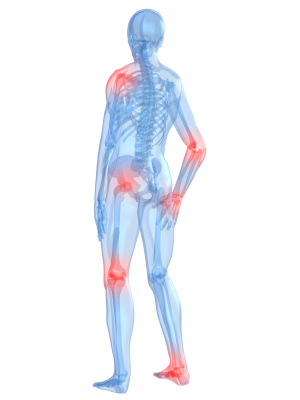Arthritis
 Arthritis in people with Hemophilia is caused by frequent or inadequately treated bleeding into joints. It is sometimes called degenerative joint disease. It may be the most common complication of severe Hemophilia. Arthritis can be avoided by properly taking care of joint bleeds. Once it occurs, it is difficult to treat.
Arthritis in people with Hemophilia is caused by frequent or inadequately treated bleeding into joints. It is sometimes called degenerative joint disease. It may be the most common complication of severe Hemophilia. Arthritis can be avoided by properly taking care of joint bleeds. Once it occurs, it is difficult to treat.
When bleeding is not stopped quickly, blood fills the space in the joint. The cells the body sends in to digest the blood also destroy the cartilage that pads the ends of the bones. Over time, the bones rub against each other and begin to wear away. Scar tissue builds up in the joint. The nearby muscles waste away from not being used. The result can be chronic and disabling pain.
Sometimes you may be unsure whether a joint is hurting from arthritis or from a bleed. If so, treat with factor. If taking factor does not relieve the pain, you may have arthritis. Your HTC can help with treatment.
Signs and symptoms of arthritis
- Pain and aching in the joints.
- Stiffness, especially in the morning.
- Decreased flexibility.
Treatment for arthritis
If you have arthritis, your treatment should include some form of exercise. Exercise will help you move easier and will make your muscles stronger. This will reduce your chances of having more bleeds. Your physical therapist can teach you the best exercises for your condition. Physical therapy can also help relieve pain and decrease the immobility caused by arthritis.
Arthritis treatment may include anti-inflammatory drugs and, if needed, medicine for pain. Many of the arthritis medicines you can buy off the shelf in the drugstore have aspirin, ibuprofen or naproxen in them. Do not take these without a specific discussion with your HTC provider, as these medications, called non-steroidal anti-inflammatories (NSAIDs) can increase your risk for bleeding. To check for NSAIDs, read the label carefully or ask the pharmacist. Your HTC can tell you which medicines are safe to take.
Your orthopedist (joint doctor) may want you to use assistive devices such as splints or other supports for your joints. Sometimes orthopedists treat arthritis with surgery to replace the destroyed joint. The advantages of replacing the joint are less pain and more movement in the joint. The disadvantage is major surgery, which requires a lot of factor and rehabilitation. Currently, joint replacement is not a permanent solution. It is not done on children and teens whose bones are still growing.
Ways to prevent arthritis
- Exercise regularly to improve mobility and muscle strength.
- Treat joint bleeds quickly.
- Visit your HTC regularly for check-ups.
